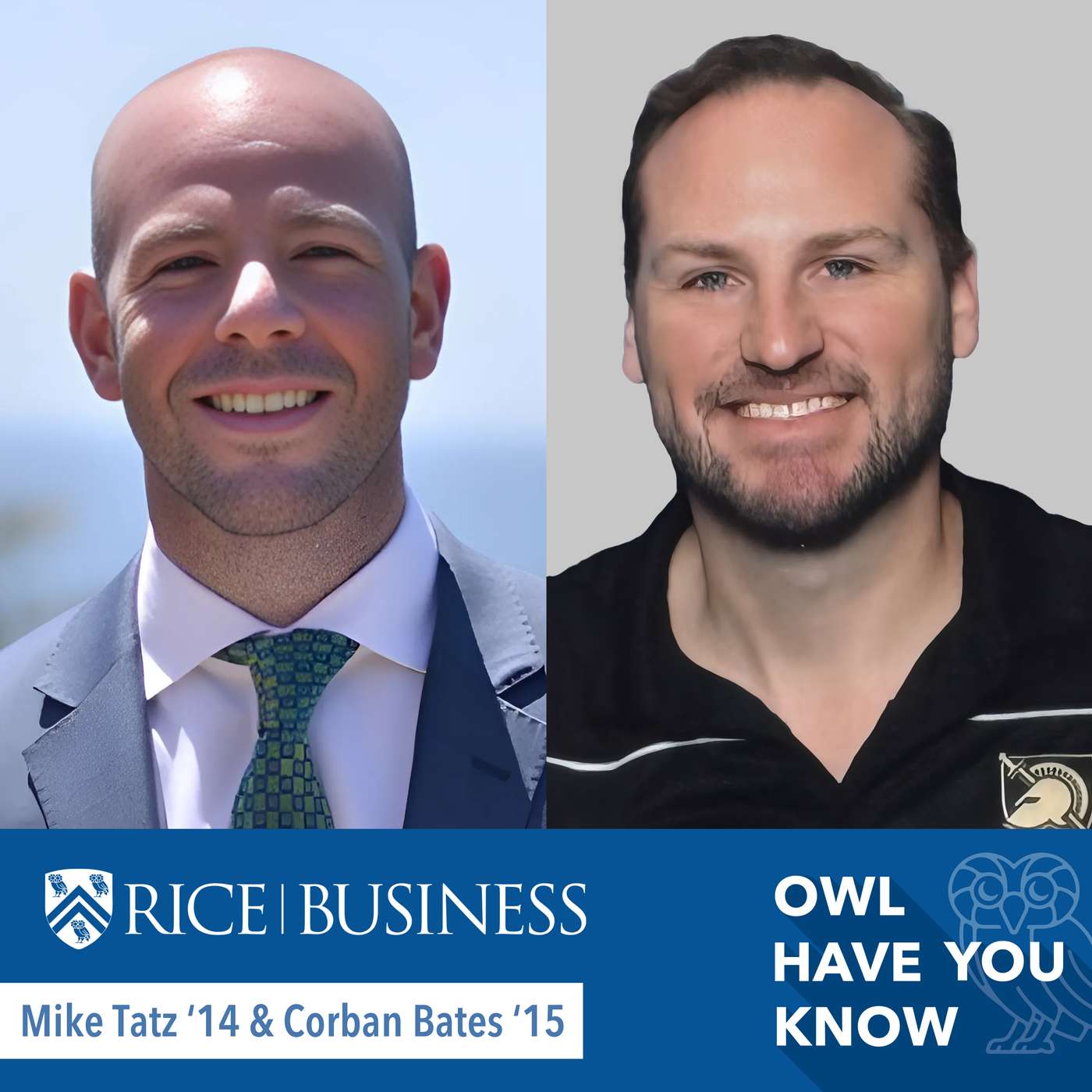Connecting Investors and Veteran Entrepreneurs feat. Mike Tatz ’14 and Corban Bates ’15
- Author
- Rice Business
- Published
- Wed 30 Jul 2025
- Episode Link
- https://share.transistor.fm/s/0429087a
During their time at Rice Business, Mike Tatz ’14 and Corban Bates ’15 saw an opportunity to connect veterans with capital and the network needed to start a business. As veterans themselves, they understood how important it is to have the right connections and platform to pitch an idea. With that, the Veterans Business Battle was born.
But Mike and Corban’s story starts long before Rice. The two first met as students at West Point and followed similar paths — from Division I athletics to Army service to financial services, and eventually entrepreneurship. After launching the Veterans Business Battle and earning their MBAs at Rice, Mike went on to found a CBD company for athletes, and Corban began overseeing direct investments into private companies — now serving as the chief financial officer for one of those investments.
Mike and Corban join co-host Maya Pomroy ’22 to chat about how their time at West Point shaped them, what brought them to Rice Business and the impact the Veterans Business Battle has had over the past decade.
Episode Guide:
00:00 Meet Mike and Corban
03:01 Life at West Point: Challenges and Lessons
08:38 Transitioning From Military to Business School
12:57 Creating the Veterans Business Battle
20:18 The First Prize and Investor Opportunities
22:15 The Journey and Impact of the Competition
24:01 Career Transitions and Personal Growth
25:29 Mike’s Venture Into the Sports Industry
27:57 Corban's Path to Artisan Bakery
33:43 Final Thoughts and Advice for Aspiring Entrepreneurs
Owl Have You Know is a production of Rice Business and is produced by University FM.
Episode Quotes:
The conversation that led Corban from Army to business school
On unapologetically pursuing what lights you up
34:29: [Mike Tatz] I think a lot of people, even at business school, they get very pigeonholed into thinking that they have to be a consultant or an investment banker because they think about the financial support that it is going to give them or the safety net. There is a gazillion ways to make money out there. I think you have got to be happy. You have got to be happy. And you can be, but you have got to take that leap. You have got to have a plan. And then once you figure out what it is, you go, baby. You go as hard as you can, and you make everybody else think that you are crazy for how hard you are working at whatever you are doing. If you do that, I think good things are going to happen.Why veterans and business school are a perfect match
17:09: [Corban Bates] Rice came up with this concept of really bringing on more veterans to their business school. I think it’s a great match of veterans being very far along in their leadership development and people management development by the time they’re in their late twenties, but being behind on the business concepts. And then you pair, you know, the rest of the civilians who are advanced in their business concepts but are probably lacking on the leadership front — probably haven’t led that much in their twenties. And so it’s this great pairing where both sides can learn from each other.The business network gap veterans face
13:35: [Mike Tatz] I don’t think veterans need any special treatment, nor should they expect — or do we expect — any special treatment. But what I do think is the case is that, going back to that last example — let’s say I do want to start a business. I'm starting a business. There are a lot of steps to it, but one of those steps that is crucial is capital. And so my network, being in the military, is Army sergeants, Army majors, privates — whatever it may be, right? They're not the Goldman Sachs folks. They’re not the people looking to make investments into companies. They’re not the people with the means to not only provide financial capital, but mentorship capital and experience capital that you would need as somebody being in the military, coming out and trying — and wanting — to start your own business.
Show Links:
Guest Profiles:
